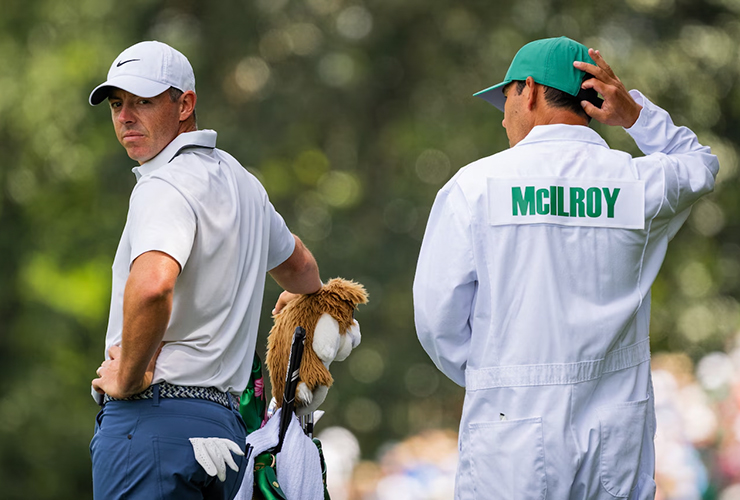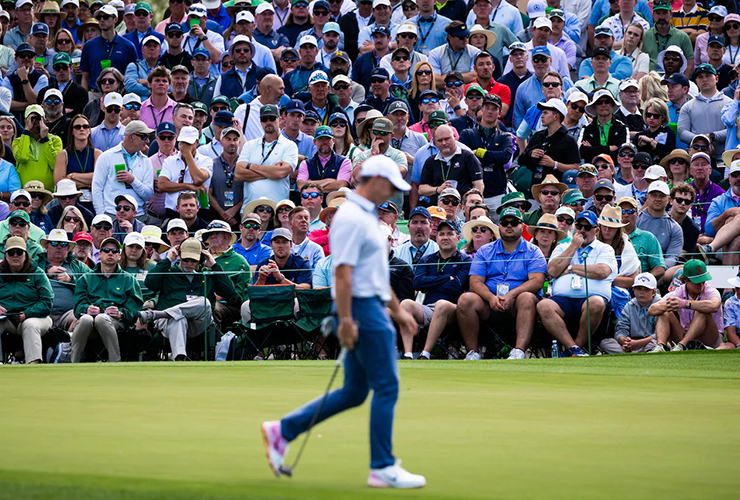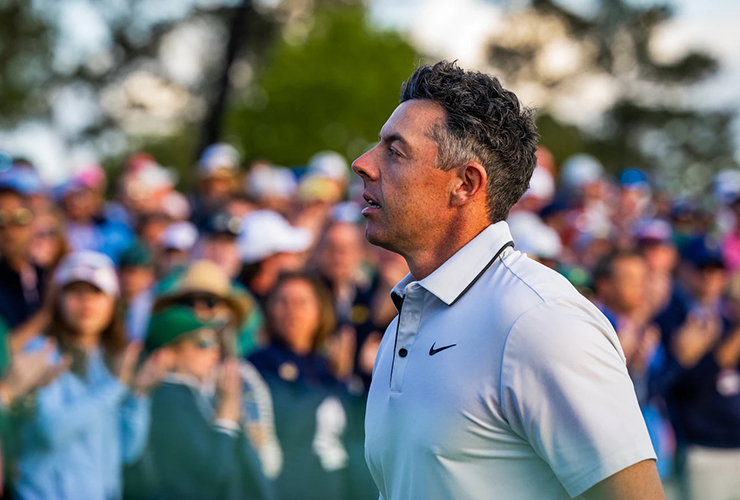The roars reverberated through the towering loblollies, awakening the echoes that define this course and tournament, capable of immortalising or condemning players for eternity, sending shivers through bone and memory. These weren’t cheers; they were primal, authoritative declarations. And while they celebrated Rory McIlroy’s performance, they also heralded the inevitable: We’ve reached the precipice. Sunday at the Masters will become the crowning achievement of McIlroy’s illustrious career or its most devastating chapter.
You can’t see what he did and think anything different. A six-under 66 for a two-shot lead over Bryson DeChambeau, his first 54-hole lead at the Masters since Augusta National first broke his heart in 2011. A day spurred by a historic start.
Augusta’s magnetic appeal lies in its capacity to produce episodes so iconic they need only a word or two for golf enthusiasts to instantly recognize. Saturday witnessed McIlroy inscribing the latest chapter into this sacred text. Though the title bears his name alone, the patrons became co-authors, their voices rising that built with each shot:
“Yeah, RORY!” The first eruption.
“C’MON, RORY!!” The building wave.
“RORRRRRRYY!!!” The avalanche.
For the record, here’s what ignited those thunderous roars: McIlroy launched a 371-yard drive at the first hole, leaving just a gap wedge approach before sinking a 10-foot birdie putt. At the second, his 369-yard drive set up a spectacular 60-foot chip-in after overshooting the green. The third hole saw him execute a spinner from 35 yards out, followed by a confident seven-footer for another birdie. After a textbook par at the fourth, he unleashed a 340-yard missile at the fifth, placed his approach to 20 feet, and buried the putt. “He’s out of his mind right now!” exclaimed Jim Nantz, who—despite seeming subdued all week, perhaps from illness or his beloved Houston Cougars’ recent championship loss—found his trademark enthusiasm reignited by McIlroy’s brilliance. Five consecutive 3s to start the round, a Masters first, with a sixth added for good measure. Even after, ahem, “settling” for a par 4 at the seventh, a front-nine 29 seemed entirely possible. McIlroy had turned his two-shot deficit to Justin Rose into a commanding four-shot lead.
“It was such a great way to start, and you know, just to come out of the blocks like that, I think, as well, from finishing yesterday afternoon to teeing off today, it’s quite a long time,” McIlroy said Saturday evening. “You know, there’s a lot of anticipation and sort of anxious energy that builds up. You just want to get out there and play.”

JD Cuban
Golf’s inherent difficulty reasserted itself, even for McIlroy, who typically makes this maddening game appear deceptively simple. He stumbled with a bogey at the eighth—statistically the day’s second-easiest hole—then missed a straightforward birdie opportunity at the ninth before surrendering another stroke at the 10th, reopening the door for his pursuers. In those three holes lay the essence of his burden: Even as rational observers understand that five under through seven holes can’t be sustained, with McIlroy, rationality has never applied. As spectacularly as it had all come together, it threatened to unravel with equal swiftness.
Then McIlroy revealed something we’ve questioned whether he possessed—a ruthlessness missing at St. Andrews, absent in Los Angeles, nowhere to be found at Pinehurst.
Another titanic drive, 340 yards at the 15th, left him with a 6-iron in hand. The same hole that had punished him Thursday, that had invited whispers about whether he would ever grasp the nuance and courage required to master these grounds. This time McIlroy found redemption, his approach chased with the confidence of a predator certain of its kill. The ball landed with delicate precision to the right before curving left, settling six feet from the cup for an eagle that disappeared without ceremony. It was the kind of shot destined for eternal replay at Augusta, contingent only on tomorrow’s outcome.
Only. For all Saturday’s brilliance, it remains just that, Saturday. His tally of four major championships is a number that’s been suspended in amber despite countless opportunities, a number that perpetually keeps him stuck between his celebrated past and his tantalizingly unrealized potential. Therein lies the paradox: today’s brilliance surpasses the performances that first announced him to the world, yet McIlroy cannot escape his own shadow. His talent, which makes the extraordinary appear effortless, has become his greatest gift and his heaviest burden. The very ease with which he can dominate makes each unfulfilled promise more haunting.
But Sundays? Sundays are redemption songs, opportunities for McIlroy to seize the pen and rewrite what the narrative we’ve inscribed for him.
“I think I still have to remind myself that there’s a long way to go,” McIlroy said. “I, just as much as anyone else, know what can happen on the final day here. You know, I’ve got a lot of experience. I came in here talking about being the most complete version of myself as a golfer, and you know, I just have to keep reminding myself of that and remind myself that no matter what situation or scenario I find myself in tomorrow, I’ll be able to handle it.”
And here is the narrative, fair or unfair: For more than a decade, we’ve been mystified that this generation’s superstar cannot summon that same brilliance during those four weeks that define greatness. McIlroy has repeatedly positioned himself within striking distance, only to see others leave with the trophy. The accumulation of these near-misses has created its own crushing gravity, each subsequent shortfall not merely a tournament but a referendum on his legacy, contributing to a story that has developed its own momentum.
McIlroy understands this. He’s spoken about it repeatedly this year—how the price of heartbreak is one he’s willing to pay in his pursuit. It’s a poetic perspective on this sport, on existence itself. Also one that cannot encompass the depth of the heartbreak itself. Nevertheless, this philosophy serves as McIlroy’s guiding principle, leading him to this pivotal moment.

JD Cuban
This is why tomorrow exists at the extremes, despite just a two-shot advantage—even McIlroy’s most devoted supporters must acknowledge what defeat would mean. More emotional and psychological wounds for someone who’s endured more than his share. Additional ammunition for his critics, especially since his primary challenger is DeChambeau—the very man who edged him by a single stroke at Pinehurst in his most devastating recent defeat, the man representing the circuit McIlroy has opposed for three years. More collective sorrow for a sport that hangs on his every action. More whispers about his inability to conquer a course seemingly designed for his abilities. More evidence that when golf demands its highest stakes, McIlroy cannot conjure the necessary magic and resolve. His eternal struggle confirming why “eternal” features in its description.
At the opposing end stands a victory of magnitude, one that would enshrine McIlroy in golf’s most exclusive pantheon as the sixth player ever to complete the career Grand Slam. Yet such an achievement would merely be the vessel for something far more significant.
For 11 years at golf’s grandest stages, McIlroy has absorbed blow after blow, yet rather than retreating behind protective walls, he has laid bare his vulnerability. What we’ve witnessed is not the manufactured persona of an athletic demigod but a soul achingly, devastatingly human—and while we cannot comprehend what it means to possess his power or skill, the anguish of disappointment speaks a language we all speak. This is why tomorrow transcends a mere battle between McIlroy and fate; it becomes a collective experience, binding him with the patrons walking alongside him and millions watching from afar, all united in hoping fate finally delivers what seems long overdue.
“It’s amazing to have the support. You know, these patrons and these galleries are a pleasure to play in front of, each and every year we come back,” McIlroy said. “They are some of the most knowledgeable golf Patrons or spectators that we play in front of. Yeah, look, it’s a pleasure to play in front of them and to have that atmosphere and that support. Tomorrow in that final group is going to be—it’s going to be a little rowdy and a little loud. I’m just going to have to settle in and really try to keep myself in my own little bubble and keep my head down and, you know, sort of approach tomorrow with the same attitude that I have tried to approach the last three days with.”
Earlier this week, McIlroy told the media he was reading a book called “The Reckoning.” Seems right. There is no middle ground when the heart stands exposed. Rory McIlroy stands at the precipice, offering his, fully aware it may return to him shattered once again. That is the price. The reward? Liberation from the prison of unfulfilled promise, the silencing of every doubt that has questioned who he is as a player and person. The reward is everything he’s ever wanted—and everything we’ve wanted for him.
Main Image: JD Cuban









